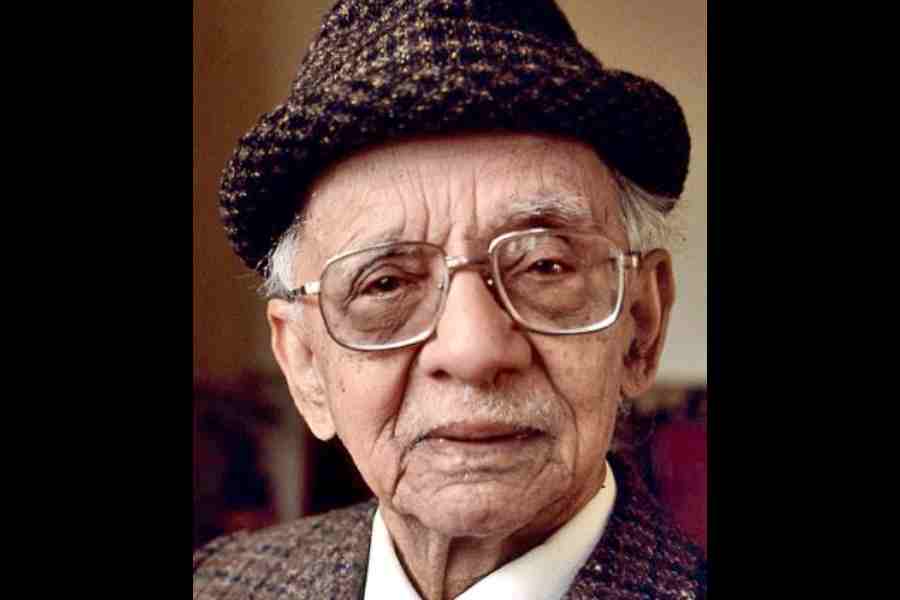Knowing the unknown
Prabhu Guptara, who runs a niche publishing house called Pippa Rann Books & Media (named after his late wife), tells me that he is bringing out a fresh biography of Nirad C Chaudhuri next year to mark the 25th anniversary of the great man’s passing. The title — Knowing the Unknown: Nirad C Chaudhuri — is a nod to Niradbabu’s own Autobiography of an Unknown Indian, which came out in 1951. It is being written by his longtime friend, Alastair Niven, who was variously the director of literature at the British Council, the president of English PEN, and has written books on DH Lawrence, Raja Rao and Mulk Raj Anand.
Niven examines Niradbabu’s major works in a fresh appraisal and asks “How in an age of extreme opinions and cancel culture does Nirad Chaudhuri’s reputation for the fastidious assertion of civilised values stand up today?”
“I first approached Nirad Chaudhuri in the early 1970s, when I was living in Scotland, to give a talk at the University of Stirling,” Niven tells me. “He came back to receive an honorary degree there. When I moved south in 1978 I made contact with him at his home in Oxford, where he had settled for his old age, and thereafter saw him regularly up to his death at the age of 101. He was always friendly and engaged, though intellectually challenging. His wife, Amiya, humanised him and kept their finances on an even keel by careful husbandry. Nirad Chaudhuri had a reputation for vanity and brusqueness. I only encountered a vast relish for life and great kindness.”
Great ruler
At the British Museum’s fabulous new exhibition, Luxury and Power: Persia to Greece, exploring the relationship between luxury and power in the Middle East and southeast Europe between 550-30 BC, I came across an old friend — Alexander III of Macedon, better known, of course, as Alexander the Great. I learnt that “this was a period when the Persian empire of ancient Iran clashed with the cities and kingdoms of Greece before it was conquered by Alexander”.
We first learnt about Alexander the Great as children at St Xavier’s School, Patna. We were told that in India, he was called Sikander, and that while his horses triumphed over Emperor Porus’s elephants at the battle of the Indus, Alexander behaved like a thorough gentleman in dealing with the vanquished.
I bought a copy of the biography, Alexander the Great: The Truth Behind the Myth, by Paul Cartledge, who was the professor of Greek History at Cambridge. The book confirms the tale we were told as kids. Well, more or less.
Cultural ambassador
These days I go far too often — sadly — to the Golders Green Crematorium in north London. Last Sunday, it was to bid farewell to Srichand Parmanand Hinduja, the head of the Hinduja business empire, who died in London, aged 87, on May 17. He got me up for many, many dawn walks in St James’s Park.
Relatives and friends packed the West Chapel, where there was a garlanded portrait of SP and two ‘Om’ symbols illuminated high on a wall. Others followed a live streaming as Hindu priests led prayers and a rendering of “ Raghupati Raghava Raja Ram ”.
Shortly afterwards, there was a memorial meeting at Soane Hall in Marylebone, where SP’s younger brother, Gopi, said he had “received many letters from prime ministers, presidents, and rulers of different countries,” including condolence messages from Rishi Sunak and Manmohan Singh.
Rishi’s letter — read out by SP’s youngest brother, Ashok — said that “he led the Hinduja group with great pride, making it into one of the UK’s most successful businesses. SP was undoubtedly a unique figure in London. He adored this great country and he made it his mission in life to give back to Britain, which had granted him and his family so many opportunities. In doing so, he always promoted his proud Indian culture and traditions, playing a particular key role in promoting Indian art. His Diwali receptions were rightly famous.”
Cherie Blair, who attended both the funeral and the memorial, relayed the sentiments of her husband, the former prime minister, Tony Blair: “He knew how to succeed in making money. But he knew money was not an end in itself.”
Past lessons
Nandini Das, who is an Oxford don, discussed her book, Courting India: England, Mughal India and the Origins of Empire, at the Khushwant Singh Literary Festival, which was held on the weekend at SOAS. Nandini’s book deals in part with the life and times of Thomas Roe, the English ambassador to the court of the Emperor Jahangir for three years until 1619.
“What does history, especially your book, teach us?” I asked Nandini after her session. “Religious tolerance,” she replied. “When Roe came back to England from India, he was asked how unity could be achieved. Roe talked about how different religions co-existed in India. His answer was, ‘Religious tolerance.’”











